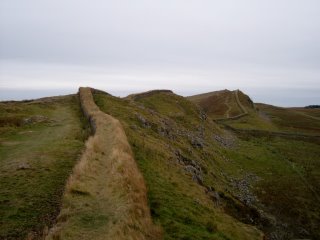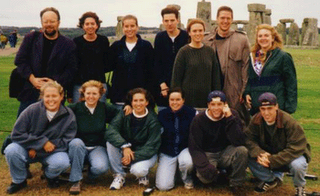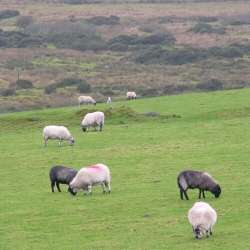Written as a writing process project for one of my graduate school classes.
 The northern wind chafes my nose and ears. It’s bitter cold on the barren ridge. The rest of my group is clustered downhill, away near the bus. When the wind picks up, I can’t hear them at all. I will myself to believe that it’s two thousand years ago, that I’ve been assigned to guard this frontier against the barbarians. It doesn’t work. Sleepy, hungry and growing cold in spite of my sweater, I am undeniably here, now, in my head, with my thoughts – and my imagination is clearly out of order. Hadrian’s Wall, once a triumph of military engineering, is too low and mossy to seem anything other than quaint. I feel transfixed in the present, and it’s impossible to forget the rest of the group, or the bus. Picking my way unsteadily along the low, broad, jumbled top of the Wall – am I supposed to be doing this? – I move further from the group, and from Kim.
The northern wind chafes my nose and ears. It’s bitter cold on the barren ridge. The rest of my group is clustered downhill, away near the bus. When the wind picks up, I can’t hear them at all. I will myself to believe that it’s two thousand years ago, that I’ve been assigned to guard this frontier against the barbarians. It doesn’t work. Sleepy, hungry and growing cold in spite of my sweater, I am undeniably here, now, in my head, with my thoughts – and my imagination is clearly out of order. Hadrian’s Wall, once a triumph of military engineering, is too low and mossy to seem anything other than quaint. I feel transfixed in the present, and it’s impossible to forget the rest of the group, or the bus. Picking my way unsteadily along the low, broad, jumbled top of the Wall – am I supposed to be doing this? – I move further from the group, and from Kim. The muted, autumnal English countryside all around is beautiful, but I feel disappointed in the site, in my lack of imagination. This same feeling of curdled anticipation was even worse at Stonehenge earlier this year.
 I felt nothing looking at it. That’s not true – I felt betrayed. The rocks looked small and somehow artificial. This is less of a letdown, because the Wall isn’t as iconic a sight, but it’s a similar, familiar feeling. I know that berating myself for insufficient awe is absurd, that I should just relax and take everything in, but it’s no use. I’m so preoccupied with analyzing my own feelings and worrying about idiotic details, like a tooth that seems to be getting sensitive and a floating thing in one of my eyes, that I am unable to enjoy the moment. I look away from the bus, off into the fields and into the misty distance. It seems as if it might rain soon. The floating thing inside of my eye bobs up and down in agreement.
I felt nothing looking at it. That’s not true – I felt betrayed. The rocks looked small and somehow artificial. This is less of a letdown, because the Wall isn’t as iconic a sight, but it’s a similar, familiar feeling. I know that berating myself for insufficient awe is absurd, that I should just relax and take everything in, but it’s no use. I’m so preoccupied with analyzing my own feelings and worrying about idiotic details, like a tooth that seems to be getting sensitive and a floating thing in one of my eyes, that I am unable to enjoy the moment. I look away from the bus, off into the fields and into the misty distance. It seems as if it might rain soon. The floating thing inside of my eye bobs up and down in agreement.A small flock of sheep is grazing on the hillside, with the ancient Roman wall serving as boundary of their enclosure. I hop down from the wall because the next section is too dilapidated to walk upon, and I see a sheep, perhaps 15 feet away, sprawled motionless on its side. Its hindquarters are towards me, and I can see that it is giving birth. Part of a wet membraneous sac is protruding from the sheep, and as I approach I can see the damp folded limbs of the lamb inside. The mother sheep is breathing rapidly, and its eyes are rolling wildly in its head. I stand motionless and watch for a minute. I have never seen anything giving birth firsthand, at least not that I can remember.
 After some unproductive spasming the ewe’s breathing slows, and its head drops to the damp grass below. It’s clearly exhausted. Kim comes up and we watch together. Neither animal is moving very much, and the mother is breathing very slowly. I have no knowledge of ovine obstetrics but something about the resigned rise and fall of its ribs, the limp splay of its legs on the brownish turf, makes me think the mother sheep has been trapped here in the same position for quite some time. Perhaps hours. “Maybe I should pull out the baby or something – like they always do on TV,” I venture. “Maybe... I have no idea,” Kim says. I stare at the sheep for another minute.
After some unproductive spasming the ewe’s breathing slows, and its head drops to the damp grass below. It’s clearly exhausted. Kim comes up and we watch together. Neither animal is moving very much, and the mother is breathing very slowly. I have no knowledge of ovine obstetrics but something about the resigned rise and fall of its ribs, the limp splay of its legs on the brownish turf, makes me think the mother sheep has been trapped here in the same position for quite some time. Perhaps hours. “Maybe I should pull out the baby or something – like they always do on TV,” I venture. “Maybe... I have no idea,” Kim says. I stare at the sheep for another minute. This was my first trip to the north of England. We had all driven up that morning in the bus from Ambleside, in the Lake Country. I was studying abroad in London for the semester, and this was our big group trip. The lakes and Hadrian’s Wall. The Lake Country was beautiful, and we’d just seen Wordsworth’s cottage.
 These might have been boring destinations for most 20-year-olds, and indeed probably were for some of my classmates, but my girlfriend Kim was visiting and we were enjoying the time together. The long hours in the rented bus (or “coach,” as they called it), however, made me feel queasy and detached from everything. I had always been interested in Roman history, and Roman Britain in particular. Back in London I had sought out museums and sites with Roman remains. But it seemed like a chore to muster enthusiasm for Hadrian’s Wall.
These might have been boring destinations for most 20-year-olds, and indeed probably were for some of my classmates, but my girlfriend Kim was visiting and we were enjoying the time together. The long hours in the rented bus (or “coach,” as they called it), however, made me feel queasy and detached from everything. I had always been interested in Roman history, and Roman Britain in particular. Back in London I had sought out museums and sites with Roman remains. But it seemed like a chore to muster enthusiasm for Hadrian’s Wall. I had trouble mustering enthusiasm for a lot of things that year, actually. Living and studying in London had been wonderful, but as the year had progressed I had been feeling more and more distant from the world around me. I was friends with several of the people on the program, but only up to a point. I enjoyed my classes and exploring London’s streets, but I also felt overwhelmed easily and spent a lot of time reading in my room. I had hardly taken any trips outside the city, and I felt guilty about not taking better advantage of being abroad. When I had free time I would take long walks through the city, usually ending up in a record store and often buying CDs, which was another occasion to feel guilty. They had CDs back in America.
Thus, on the trip to Hadrian’s Wall I was feeling very strange after several months of exciting, educational London life which was, somehow, becoming tainted by vague, creeping unease. The fact that Kim was there made me feel much, much better, but I still felt slightly odd, as if I were watching the world from behind a pane of glass. The long bus rides behind an actual pane of glass didn’t help.
I look at the panting sheep, unable to come to a decision. Aside from our group there’s no one in sight for miles around. I certainly don’t see a gruff farmer or kindly local vet. Kim looks up at me. A chain of thoughts rush in circles through my head.
 The sheep seems to be having trouble giving birth.
The sheep seems to be having trouble giving birth.Should I help in some way?
I have no idea.
I don’t want to get my sweater dirty.
What if I made things worse?
I wouldn’t want to be responsible for a dead lamb.
Better not to interfere.
Maybe I would pull too hard and pull its leg off or something.
And what if I got goop on my sweater?
I just bought this sweater.
It wasn’t an expensive sweater, but I’d have to first take it off.
And then my hair would get all messed up.
Or I could push up the sleeves...
But then wouldn’t the elastic on the wrists get stretched out?
Is this sweater wool?
Maybe I could sort of poke it with a branch, or...
No, it would have to be hands-on.
What is that stuff? Placenta?
Forget it. This is none of my business.
That’s just an excuse. You’re just scared.
But it’s none of my business.
I’ve seen several instances on TV where someone had to pull a baby farm animal out of the mother.
Shouldn’t I do that?
But I have no idea what to do or how to do it.
What would I do with my sweater?
I do not move. I do nothing. The mother sheep’s side slowly rises and falls as it labors to breathe.
As far as I know, I am sentencing both animals to death. Standing and thinking instead of helping. What’s wrong with me? Do other people have this problem? I get a nauseous feeling that tells me that somehow I’ve made the wrong choice, but I can’t make myself do it differently. I’m still standing just feet away but somehow it’s already too late. I had a choice, and I did nothing, simply because doing nothing was the easiest thing to do. I wonder if I saw a human being in need of help, if my nerve would fail me like this. How can I make myself do the right thing? My current method clearly needs work. I’m disgusted at my hesitation, but instead of spurring me to action the disgust makes me want to put the whole situation behind me.
A thought flashes: I haven’t turned away yet; maybe there’s still a chance. Forget the damn sweater and just pull on that baby lamb placenta or whatever that is. The moment passes. The pane of glass descends, the floating thing in my eye pirouettes with glee. It’s time to put this all behind us. As I turn away I feel a dull, toxic satisfaction in having taken the easy route, a poisonous contentment that blossoms black and oily within my brain. I begin to forget that I ever had a choice to make. There was nothing that could have been done. It was none of your business.
“Let’s go back to the bus,” I say to Kim. “I’m getting cold out here.”

1 comment:
Wow, powerful stuff. I ached as I read this, I could feel your uncertainty and the awfulness of succumbing to the path of least resistance. I think we're all done this, and one of the horrors of modern life is that it's often easier to turn away.
On the other hand, what could you have done really? I would have done the same.
Post a Comment